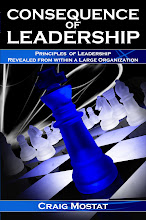The most destructive force in any organization is that of individuals within treating others with contempt. Consider the following with respect to marriage relationships:
John Gottman, Ph.D., a well respected psychologist and marriage researcher, says he can predict with 95% accuracy whether a marriage will end in divorce within 15 years by micro analyzing a videotape of the pair talking for an hour. His secret is paying attention to the number of times in the conversation the couples participate in what he calls the Four Horsemen:
- Defensiveness: A response like "It's not my fault, it's your fault!" to a real or imagined attack.
- Stonewalling: The silent treatment. This seems to be more common in men than women.
- Criticism: Labeling a partner with a negative trait such as "You're selfish."
- Contempt: Labeling a partner with a negative trait as if the blamed person is inferior and the criticizer is superior. Contempt is often shown through body language: tone of voice, facial expressions, and body movement. Just a roll of the eyes can signal that someone considers themselves above you.
As reported in Blink: The Power of Thinking Without Thinking by Malcolm Gladwell, Gottman indicates that contempt is the single greatest indicator of a future relationship breakup.
Psychology Today
Contempt is disrespect and condescension that attempts to put others on a lower plane. Gottman suggests that he can predict the future success of a marriage by just overhearing a conversation between couples in a restaurant over dinner, specifically listening for indicators of contempt.
A relationship is a relationship, why would there be any difference in the relationships within an organization? However, instead of divorce, we would have dysfunction, infighting, lack of trust and collaboration. In extreme cases, the destructive energy could be similar to what we saw in the 1989 film The War of the Roses (Michael Douglas & Kathleen Turner), where the goal was mutual mental and physically destruction.
Contemptuous behaviour in organizations should be confronted and dealt with quickly. Disagreement and debate is necessary. However, healthy disagreement is respectful and professional. Everyone inside, or who is exposed to your organization, deserves to be treated with respect and dignity – everyone.
We need to start with ourselves; do you view others (at work or at home) as inferior? The consequences of this thinking and the resulting behaviour are well documented.

Contempt



